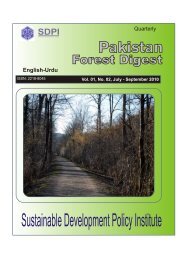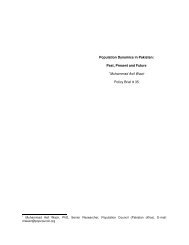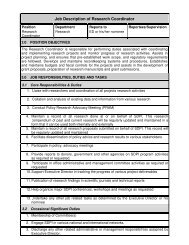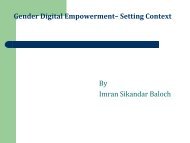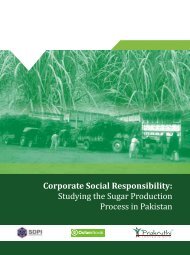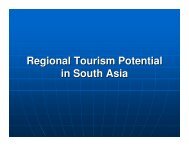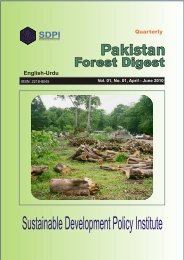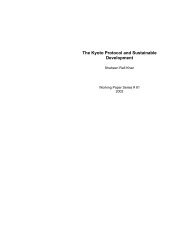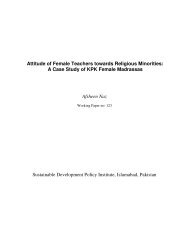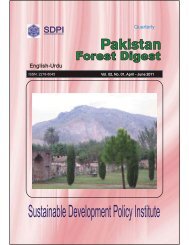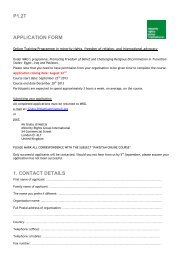Annual Report 2009-10 - Sustainable Development Policy Institute
Annual Report 2009-10 - Sustainable Development Policy Institute
Annual Report 2009-10 - Sustainable Development Policy Institute
- No tags were found...
Create successful ePaper yourself
Turn your PDF publications into a flip-book with our unique Google optimized e-Paper software.
<strong>Annual</strong> <strong>Report</strong><strong>2009</strong> - 20<strong>10</strong>Globalization: A New Road to <strong>Sustainable</strong> <strong>Development</strong>Is globalization a blessing or a curse? Is it a panacea for all or the root cause of all-evil? Thejury is still out where both proponents & opponents are all out with their strong arguments.SDPI always considers that globalization offers both challenges as well as opportunities and it isour level of preparedness coupled with the provision of a conducive environment (especially national& global governance) that can either make globalization work for us or not.In order to understand various dimensions of globalization & global changes research studiesare also being conducted in the year 20<strong>10</strong>.Some of the research studies are presented in the following sections.Economic <strong>Development</strong>Poverty-Oriented <strong>Development</strong> <strong>Policy</strong> Beyond the Millennium <strong>Development</strong> Goals CosmeticAdjustments or Fundamental ChangesThe captioned study has been commissioned by the University of Zurich under the NationalCenter for Competence Research Program. The theme of the study is to generate an informeddebate on the perceived framework of MDGs between developing and developed countries.SDPI research will be contributing to this debate in the context of the terms of taking country'sposition on the MDGs especially goal 1.<strong>Development</strong> cooperation between northern donors and southern/eastern states is characterizedby a variety of approaches, interests, varying degrees of stakeholder involvement, differencesin priority setting, and modalities of engagement. Still, these variations are underpinnedby a surprisingly similar perception of the causes of underdevelopment and the interventions requiredto overcome it. Indeed, development in its present guise is based on an understandingof, and guided by, ontology of "inclusive liberalism" which differs slightly from the neo-liberal andWashington Consensus paradigms of the 1980s. The core ontology of inclusive liberalism,though, continues to be based on a market-growth paradigm, reflecting, in political economicterms, a 'capitalist' imagination of a 'developed society'. The formation of this mainstream hasbeen supported by recent trends towards 'donor harmonisation', including procedures such as'Poverty Reduction Strategy Papers'. Its core marker, though, are the Millennium <strong>Development</strong>Goals (MDGs), and we concentrate on MDG Nr. 1 (halve, between 1990 and 2015, the proportionof people whose income is less than $1 a day). Enormous efforts were undertaken to implementthese goals. As only four and a half years are left till 2015, in most cases, there is a hugegap between achievements and plans. Disenchantment spreads, but it also leads to reflexion,and it appears that the MDGs and especially its goal 1 are becoming a crucial signifier for poverty-orienteddevelopment debates for advocates of the development mainstream as well as forcritics and radical opponents.The study is commissioned by NCCR research Group under special project and carries four objectives:(1) To provide an overview on the positions, dimensions and challenges of the emergingdebate; (2) To define core dimensions that emerge in this debate (e.g. the role of the state;of private companies, civic and social movements, the nature of underlying societal visions;etc.); (3) To critically assess these core dimensions based on the knowledge base available withNCCR North-South and beyond; and (4) Based on these assessments to take position and tooutline elements of a progressive and transparent poverty-oriented development agenda beyondthe MDGs.For further details contact Ms. Afshan Ahmed. afshan@sdpi.org35S u s t a I n a b l e D e v e l o p m e n t P o l I c y I n s t I t u t e



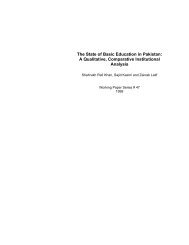
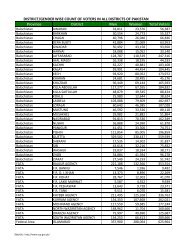
![(October - December, 2010) [13th SDC Special Bulletin]](https://img.yumpu.com/50118608/1/184x260/october-december-2010-13th-sdc-special-bulletin.jpg?quality=85)
